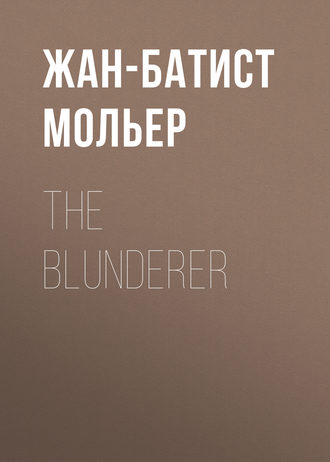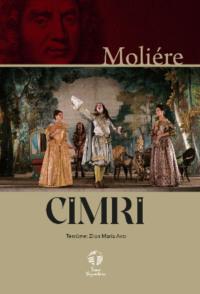 полная версия
полная версияThe Blunderer
SCENE VI. – ANSELMO, MASCARILLE
ANS. Upon my word, this is a strange age we live in; I am ashamed of it; there was never such a fondness for money, and never so much difficulty in getting one's own. Notwithstanding all the care a person may take, debts now-a-days are like children, begot with pleasure, but brought forth with pain. It is pleasant for money to come into our purse; but when the time comes that we have to give it back, then the pangs of labour seize us. Enough of this, it is no trifle to receive at last two thousand francs which have been owing upwards of two years. What luck!
MASC. (Aside). Good Heavens! What fine game to shoot flying! Hist, let me see if I cannot wheedle him a little. I know with what speeches to soothe him. (Joining him). Anselmo I have just seen…
ANS. Who, prithee?
MASC. Your Nerina.
ANS. What does the cruel fair one say about me?
MASC. Say? that she is passionately fond of you.
ANS. Is she?
MASC. She loves you so that I very much pity her.
ANS. How happy you make me!
MASC. The poor thing is nearly dying with love. "Oh, my dearest Anselmo," she cries every minute, "when shall marriage unite our two hearts? When will you vouchsafe to extinguish my flames?"
ANS. But why has she hitherto concealed this from me? Girls, in troth, are great dissemblers! Mascarille, what do you say, really? Though in years, yet I look still well enough to please the eye.
MASC. Yes, truly, that face of yours is still very passable; if it is not of the handsomest in the world, it is very agreeable. [Footnote: The original has a play on words which cannot be translated, as, ce visage est encore fort mettable…s'il n'est pas des plus beaux, il est des agreables; which two last words, according to pronunciation, can also mean disagreeable. This has been often imitated in French. After the Legion of Honour was instituted in France in 1804, some of the wits of the time asked the Imperialists: etes-vous des honores?]
ANS. So that…
MASC. (Endeavouring to take the purse). So that she dotes on you; and regards you no longer…
ANS. What?
MASC. But as a husband: and fully intends…
ANS. And fully intends…?
MASC. And fully intends, whatever may happen, to steal your purse…
ANS. To steal…?
MASC. (Taking the purse, and letting it fall to the ground). To steal a kiss from your mouth.
[Footnote: There is here again, in the original, a play on the words bourse, purse, and bouche, mouth, which cannot be rendered in English.]
ANS. Ah! I understand you. Come hither! The next time you see her, be sure to say as many fine things of me as possible.
MASC. Let me alone.
ANS. Farewell.
MASC. May Heaven guide you!
ANS. (Returning). Hold! I really should have committed a strange piece of folly; and you might justly have accused me of neglect. I engage you to assist me in serving my passion. You bring good tidings, and I do not give you the smallest present to reward your zeal. Here, be sure to remember…
MASC. O, pray, don't.
[Footnote: Compare in Shakspeare's Winter's Tale Autolyeus' answer to Camillo (Act IV., Scene 3), who gives him money, "I am a poor fellow, sir, … I cannot with conscience take it."]
ANS. Permit me…
MASC. I won't, indeed: I do not act thus for the sake of money.
ANS. I know you do not. But however…
MASC. No, Anselmo, I will not. I am a man of honour; this offends me.
ANS. Farewell then, Mascarille.
MASC. (Aside). How long-winded he is!
ANS. (Coming back). I wish you to carry a present to the fair object of my desires. I will give you some money to buy her a ring, or any other trifle, as you may think will please her most.
MASC. No, there is no need of your money; without troubling yourself, I will make her a present; a fashionable ring has been left in my hands, which you may pay for afterwards, if it fits her.
ANS. Be it so; give it her in my name; but above all, manage matters in such a manner that she may still desire to make me her own.
SCENE VII. – LELIO, ANSELMO, MASCARILLE
LEL. (Taking up the purse). Whose purse is this?
[Footnote: During the whole of the preceding scene Mascarille has quietly kicked the purse away, so as to be out of sight of Anselmo, intending to pick it up when the latter has gone.]
ANS. Oh Heavens! I dropt it, and might have afterwards believed somebody had picked my pocket. I am very much obliged to you for your kindness, which saves me a great deal of vexation, and restores me my money. I shall go home this minute and get rid of it.
SCENE VIII. – LELIO, MASCARILLE
MASC. Od's death! You have been very obliging, very much so.
LEL. Upon my word! if it had not been for me he would have lost his money.
MASC. Certainly, you do wonders, and show to-day a most exquisite judgment and supreme good fortune. We shall prosper greatly; go on as you have begun.
LEL. What is the matter now? What have I done?
MASC. To speak plainly as you wish me to do, and as I ought, you have acted like a fool. You know very well that your father leaves you without money; that a formidable rival follows us closely; yet for all this, when to oblige you I venture on a trick of which I take all the shame and danger upon myself…
LEL. What? was this…?
MASC. Yes, ninny; it was to release the captive that I was getting the money, whereof your officiousness took care to deprive us.
LEL. If that is the case, I am in the wrong. But who could have imagined it?
MASC. It really required a great deal of discernment.
LEL. You should have made some signs to warn me of what was going on.
MASC. Yes, indeed; I ought to have eyes in my back. By Jove, be quiet, and let us hear no more of your nonsensical excuses. Another, after all this, would perhaps abandon everything; but I have planned just now a master-stroke, which I will immediately put into execution, on condition that if…
[Footnote: The play is supposed to be in Sicily; hence Pagan oaths are not out of place. Even at the present time Italians say, per Jove! per Bacco!]
LEL. No, I promise you henceforth not to interfere either in word or deed.
MASC. Go away, then, the very sight of you kindles my wrath.
LEL. Above all, don't delay, for fear that in this business…
MASC. Once more, I tell you, begone! I will set about it. (Exit Lelio). Let us manage this well; it will be a most exquisite piece of roguery; if it succeeds, as I think it must. We'll try…But here comes the very man I want.
SCENE IX. – PANDOLPHUS, MASCARILLE
PAND. Mascarille!
MASC. Sir?
PAND. To tell you the truth, I am very dissatisfied with my son.
MASC. With my master? You are not the only one who complains of him. His bad conduct which has grown unbearable in everything, puts me each moment out of patience.
PAND. I thought, however, you and he understood one another pretty well.
MASC. I? Believe it not, sir. I am always trying to put him in mind of his duty: we are perpetually at daggers drawn. Just now we had a quarrel again about his engagement with Hippolyta, which, I find he is very averse to. By a most disgraceful refusal he violates all the respect due to a father.
PAND. A quarrel?
MASC. Yes, a quarrel, and a desperate one too.
PAND. I was very much deceived then, for I thought you supported him in all he did.
MASC. I? See what this world is come to! How is innocence always oppressed! If you knew but my integrity, you would give me the additional salary of a tutor, whereas I am only paid as his servant. Yes, you yourself could not say more to him than I do in order to make him behave better. "For goodness' sake, sir," I say to him very often, "cease to be driven hither and thither with every wind that blows, – reform; look what a worthy father Heaven has given you, what a reputation he has. Forbear to stab him thus to the heart, and live, as he does, as a man of honour."
PAND. That was well said; and what answer could he make to this?
MASC. Answer? Why only nonsense, with which he almost drives me mad. Not but that at the bottom of his heart he retains those principles of honour which he derives from you; but reason, at present, does not sway him. If I might be allowed to speak freely, you should soon see him submissive without much trouble.
PAND. Speak out.
MASC. It is a secret which would have serious consequences for me, should it be discovered; but I am quite sure I can confide it to your prudence.
PAND. You are right.
MASC. Know then that your wishes are sacrificed to the love your son has for a certain slave.
PAND. I have been told so before; but to hear it from your mouth pleases me.
MASC. I leave you to judge whether I am his secret confidant…
PAND. I am truly glad of it.
MASC. However, do you wish to bring him back to his duty, without any public scandal? You must… (I am in perpetual fear lest anybody should surprise us. Should he learn what I have told you, I should be a dead man.) You must, as I was saying, to break off this business, secretly purchase this slave, whom he so much idolizes, and send her into another country. Anselmo is very intimate with Trufaldin; let him go and buy her for you this very morning. Then, if you put her into my hands, I know some merchants, and promise you to sell her for the money she costs you, and to send her out of the way in spite of your son. For, if you would have him disposed for matrimony, we must divert this growing passion. Moreover, even if he were resolved to wear the yoke you design for him, yet this other girl might revive his foolish fancy, and prejudice him anew against matrimony.
PAND. Very well argued. I like this advice much. Here comes Anselmo; go, I will do my utmost quickly to obtain possession of this troublesome slave, when I will put her into your hands to finish the rest.
MASC. (Alone). Bravo, I will go and tell my master of this. Long live all knavery, and knaves also!
SCENE X. – HIPPOLYTA, MASCARILLE
HIPP. Ay, traitor, is it thus that you serve me? I overheard all, and have myself been a witness of your treachery. Had I not, could I have suspected this? You are an arrant rogue, and you have deceived me. You promised me, you miscreant, and I expected, that you would assist me in my passion for Leander, that your skill and your management should find means to break off my match with Lelio; that you would free me from my father's project; and yet you are doing quite the contrary. But you will find yourself mistaken. I know a sure method of breaking off the purchase you have been urging Pandolphus to make, and I will go immediately…
MASC. How impetuous you are! You fly into a passion in a moment; without inquiring whether you are right or wrong, you fall foul of me. I am in the wrong, and I ought to make your words true, without finishing what I began, since you abuse me so outrageously.
HIPP. By what illusion do you think to dazzle my eyes, traitor? Can you deny what I have just now heard?
MASC. No; but you must know that all this plotting was only contrived to serve you; that this cunning advice, which appeared so sincere, tends to make both old men fall into the snare; that all the pains I have taken for getting Celia into my hands, through their means, was to secure her for Lelio, and to arrange matters so that Anselmo, in the very height of passion, and finding himself disappointed of his son-in-law, might make choice of Leander.
HIPP. What! This admirable scheme, which has angered me so much, was all for my sake, Mascarille?
MASC. Yes, for your sake; but since I find my good offices meet with so bad a return, – since I have thus to bear your caprices, and as a reward for my services, you come here with a haughty air, and call me knave, cur, and cheat, I shall presently go, correct the mistake I have committed, and undo what I had undertaken to perform.
HIPP. (Holding him.) Nay, do not be so severe upon me, and forgive these outbursts of a sudden passion.
MASC. No, no; let me go. I have it yet in my power to set aside the scheme which offends you so much. Henceforth you shall have no occasion to complain of my zeal. Yes, you shall have my master, I promise you.
HIPP. My good Mascarille, be not in such a passion. I judged you ill; I was wrong; I confess I was. (Pulls out her purse). But I intend to atone for my fault with this. Could you find it in your heart to abandon me thus?
MASC. No, I cannot, do what I will. But your impetuosity was very shocking. Let me tell you that nothing offends a noble mind so much as the smallest imputation upon its honour.
HIPP. It is true; I treated you to some very harsh language, but here are two louis to heal your wounds.
MASC. Oh! all this is nothing. I am very sensitive on this point; but my passion begins to cool a little already. We must bear with the failings of our friends.
HIPP. Can you, then, bring about what I so earnestly wish for? Do you believe your daring projects will be as favourable to my passion as you imagine?
MASC. Do not make yourself uneasy on that account. I have several irons in the fire, and though this stratagem should fail us, what this cannot do, another shall.
HIPP. Depend upon it, Hippolyta will at least not be ungrateful.
MASC. It is not the hope of gain that makes me act.
HIPP. Your master beckons and wishes to speak with you. I will leave you, but remember to do what you can for me.
SCENE XI. – LELIO, MASCARILLE
LEL. What the deuce are you doing there? You promised to perform wonders, but I am sure your dilatory ways are unparalleled. Had not my good genius inspired me, my happiness had been already wholly overthrown. There was an end to my good fortune, my joy. I should have been a prey to eternal grief; in short, had I not gone to this place in the very nick of time, Anselmo would have got possession of the captive, and I should have been deprived of her. He was carrying her home, but I parried the thrust, warded off the blow, and so worked upon Trufaldin's fears as to make him keep the girl.
MASC. This is the third time! When we come to ten we will score. It was by my contrivance, incorrigible scatterbrains, that Anselmo undertook this desirable purchase; she should have been placed into my own hands, but your cursed officiousness knocks everything on the head again. Do you think I shall still labour to serve your love? I would sooner a hundred times become a fat old woman, a dolt, a cabbage, a lantern, a wehrwolf, and that Satan should twist your neck!
LEL. (Alone.) I must take him to some tavern and let him vent his passion on the bottles and glasses.
ACT II
SCENE I. – LELIO, MASCARILLE
MASC. I have at length yielded to your desires. In spite of all my protestations I could hold out no longer; I am going to venture upon new dangers, to promote your interest, which I intended to abandon. So tender-hearted am I! If dame nature had made a girl of Mascarille, I leave you to guess what would have happened. However, after this assurance, do not deal a back stroke to the project I am about to undertake; do not make a blunder and frustrate my expectations. Then, as to Anselmo, we shall anew present your excuses to him, in order to get what we desire. But should your imprudence burst forth again hereafter, then you may bid farewell to all the trouble I take for the object of your passion.
LEL. No, I shall be careful, I tell you; never fear; you shall see…
MASC. Well, mind that you keep your word. I have planned a bold stratagem for your sake. Your father is very backward in satisfying all your wishes by his death. I have just killed him (in words, I mean); I have spread a report that the good man, being suddenly smitten by a fit of apoplexy, has departed this life. But first, so that I might the better pretend he was dead, I so managed that he went to his barn. I had a person ready to come and tell him that the workmen employed on his house accidentally discovered a treasure, in digging the foundations. He set out in an instant, and as all his people, except us two, have gone with him into the country, I shall kill him to-day in everybody's imagination and produce some image which I shall bury under his name. I have already told you what I wish you to do; play your part well; and as to the character I have to keep up, if you perceive that I miss one word of it, tell me plainly I am nothing but a fool.
SCENE II. – LELIO, alone
It is true, he has found out a strange way to accomplish my wishes fully; but when we are very much in love with a fair lady, what would we not do to be made happy? If love is said to be an excuse for a crime, it may well serve for a slight piece of imposture, which love's ardour to-day compels me to comply with, in expectation of the happy consequences that may result from it. Bless me! How expeditious they are. I see them already talking together about it; let us prepare to act our part.
SCENE III. – MASCARILLE, ANSELMO
MASC. The news may well surprise you.
ANS. To die in such a manner!
MASC. He was certainly much to blame. I can never forgive him for such a freak.
ANS. Not even to take time to be ill.
MASC. No, never was a man in such a hurry to die.
ANS. And how does Lelio behave?
MASC. He raves, and has lost all command over his temper; he has beaten himself till he is black and blue in several places, and wishes to follow his father into the grave. In short, to make an end of this, the excess of his grief has made me with the utmost speed wrap the corpse in a shroud, for fear the sight, which fed his melancholy, should tempt him to commit some rash act.
ANS. No matter, you ought to have waited until evening. Besides, I should have liked to see Pandolphus once more. He who puts a shroud on a man too hastily very often commits murder; for a man is frequently thought dead when he only seems to be so.
MASC. I warrant him as dead as dead can be. But now, to return to what we were talking about, Lelio has, resolved (and it will do him good) to give his father a fine funeral, and to comfort the deceased a little for his hard fate, by the pleasure of seeing that we pay him such honours after his death. My master inherits a goodly estate, but as he is only a novice in business, and does not see his way clearly in his affairs, since the greater part of his property lies in another part of the country, or what he has here consists in paper, he would beg of you, after having entreated you to excuse the too great violence which he has shewn of late, to lend him for this last duty at least…
ANS. You have told me so already, and I will go and see him.
MASC. (Alone). Hitherto, at least, everything goes on swimmingly; let us endeavour to make the rest answer as well; and lest we should be wrecked in the very harbour, let us steer the ship carefully and keep a sharp look out.
SCENE IV. – ANSELMO, LELIO, MASCARILLE
ANS. (Coming out of Pandolphus' house). Let us leave the house. I cannot, without great sorrow, see him wrapped up in this strange manner. Alas! in so short a time! He was alive this morning.
MASC. We go sometimes over a good deal of ground in a short time.
LEL. (Weeping). Oh!
ANS. Dear Lelio, he was but a man after all; even Rome can grant no dispensation from death.
LEL. Oh!
ANS. Death smites men without giving warning, and always has bad designs against them.
LEL. Oh!
ANS. That merciless foe would not loosen one grip of his murderous teeth, however we may entreat him. Everybody must feel them.
LEL. Oh!
MASC. Your preaching will all be in vain; this sorrow is too deep-rooted to be plucked up.
ANS. If, notwithstanding all these arguments, you will not cast aside your grief, at least, my dear Lelio, endeavour to moderate it.
LEL. Oh!
MASC. He will not moderate it; I know his temper.
ANS. However, according to your servant's message, I have brought you the money you want, so that you might celebrate your father's funeral obsequies!
LEL. Oh! oh!
MASC. How his grief increases at these words! It will kill him to think of his misfortune.
ANS. I know you will find by the good man's books that I owe him a much larger sum, but even if I should not owe anything, you could freely command my purse. Here it is; I am entirely at your service, and will show it.
LEL. (Going away). Oh!
MASC. How full of grief is my master!
ANS. Mascarille, I think it right he should give me some kind of receipt under his hand.
MASC. Oh!
ANS. Nothing in this world is certain.
MASC. Oh! oh!
ANS. Get him to sign me the receipt I require.
MASC. Alas! How can he comply with your desire in the condition he now is? Give him but time to get rid of his sorrow; and, when his troubles abate a little, I shall take care immediately to get you your security. Your servant, sir, my heart is over full of grief, and I shall go to take my fill of weeping with him. Hi! Hi!
ANS. (Alone). This world is full of crosses; we meet with them every day in different shapes, and never here below…
SCENE V. – PANDOLPHUS, ANSELMO
ANS. Oh Heavens! how I tremble! It is Pandolphus who has returned to the earth! God grant nothing disturbed his repose! How wan his face is grown since his death! Do not come any nearer. I beseech you; I very much detest to jostle a ghost.
PAND. What can be the reason of this whimsical terror?
ANS. Keep your distance, and tell me what business brings you here. If you have taken all this trouble to bid me farewell, you do me too much honour; I could really have done very well without your compliment. If your soul is restless, and stands in need of prayers. I promise you you shall have them, but do not frighten me. Upon the word of a terrified man, I will immediately set prayers agoing for you, to your very heart's content.
"Oh, dead worship, please to go!Heaven, if now you disappear,Will grant you joy down there below,And health as well, for many a year."[Footnote: This seems to be an imitation of a spell, charm, or incantation to lay the supposed ghost, which Anselmo says kneeling and hardly able to speak for terror.]
PAND. (Laughing). In spite of my indignation, I cannot help laughing.
ANS. It is strange, but you are very merry for a dead man.
PAND. Is this a joke, pray tell me, or is it downright madness to treat a living man as if he were dead?
ANS. Alas! you must be dead; I myself just now saw you.
PAND. What? Could I die without knowing it?
ANS. As soon as Mascarille told me the news, I was ready to die of grief.
PAND. But, really, are you asleep or awake? Don't you know me?
ANS. You are clothed in an aerial body which imitates your own, but which may take another shape at any moment. I am mightily afraid to see you swell up to the size of a giant, and your countenance become frightfully distorted. For the love of God, do not assume any hideous form; you have scared me sufficiently for the nonce.
PAND. At any other time, Anselmo, I should have considered the simplicity which accompanies your credulity an excellent joke, and I should have carried on the pleasant conceit a little longer; but this story of my death, and the news of the supposed treasure, which I was told upon the road had not been found at all, raises in my mind a strong suspicion that Mascarille is a rogue, and an arrant rogue, who is proof against fear or remorse, and who invents extraordinary stratagems to compass his ends.
ANS. What! Am I tricked and made a fool of? Really, this would be a compliment to my good sense! Let me touch him and be satisfied. This is, indeed, the very man. What an ass I am! Pray, do not spread this story about, for they will write a farce about it, and shame me for ever. But, Pandolphus, help me to get the money back which I lent them to bury you.
PAND. Money, do you say? Oh! that is where the shoe pinches; that is the secret of the whole affair! So much the worse for you. For my part, I shall not trouble myself about it, but will go and lay an information against this Mascarille, and if he can be caught he shall be hanged, whatever the cost may be.









